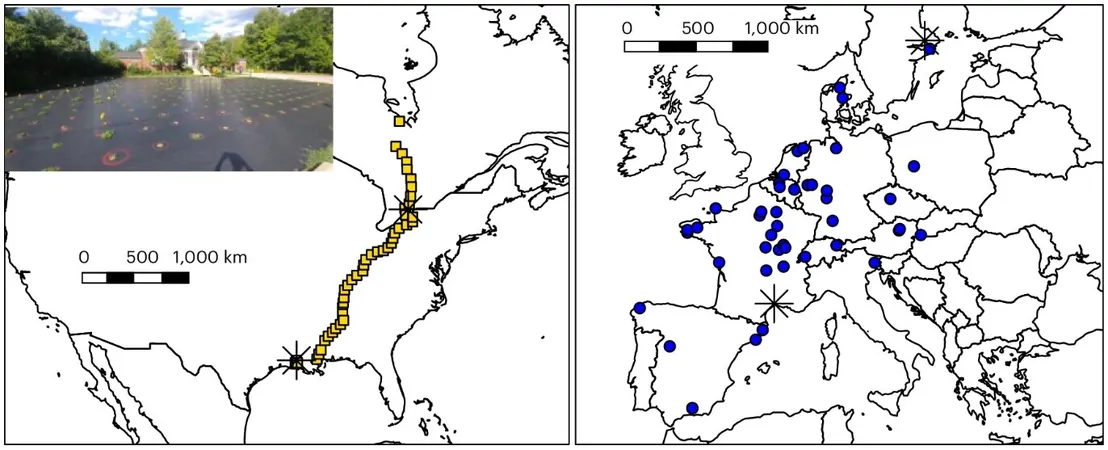
Unlocking the Secrets of Invasive Plants: White Clover's Genetic Edge
2025-07-08
Author: Wei Ling
How Invasive Plants Adapt and Thrive
Exciting breakthroughs from Monash University scientists reveal the stunning capabilities of invasive plants like white clover to adapt swiftly to diverse environments. Their remarkable findings highlight the genetic changes that fuel their global dominance.
A Major Study with Global Implications
Part of the ambitious Global Urban Evolution Project (GLUE), this groundbreaking study sheds light on the structural variations—significant chromosomal shifts that engage hundreds of genes—responsible for the parallel adaptation of white clover populations across various continents.
According to Dr. Paul Battlay from Monash University's School of Biological Sciences, these discoveries illustrate the remarkable speed at which plants can evolve when introduced to new habitats.
Genetic Diversity: The Key to Rapid Adaptation
"Our research revealed that white clover populations worldwide possess an unexpectedly high level of genetic diversity, enabling them to quickly adapt to local climates via large structural changes," Dr. Battlay noted. This revelation underscores crucial insights into how invasive species proliferate and evolution progresses in our rapidly changing world.
A Collaborative Effort Worth Noting
Associate Professor Kay Hodgins, also from Monash, emphasized the significance of global teamwork in uncovering the genetic drivers behind this rapid evolution. By sequencing over 2,600 genomes from six continents, the team found that similar genetic rearrangements allow populations to thrive under comparable climate conditions, illustrating rapid evolution occurring right before our eyes.
The Implications of Fast-Paced Evolution
Visiting Assistant Professor Brandon Hendrickson from the University of Louisiana, Lafayette, pointed out the findings present a profound narrative of genetic architecture that empowers invasive species to flourish across the globe.
Dr. Nicholas Kooyers of the same university added, "These results reveal that evolution is not merely a slow-moving process; it’s a rapid and recurring phenomenon as species respond to similar climate challenges around the world."
A Call for Global Collaboration
Leading the GLUE initiative, Professor Marc Johnson, stresses the value of collaborative efforts in addressing pressing scientific issues, such as managing invasive species. "Now, more than ever, we require international cooperation to confront significant challenges affecting humanity and our planet's ecosystems," he stated.
Building on Previous Discoveries
This new research builds on earlier GLUE findings published in 2022, which documented the evolutionary responses to urban settings in over 150 cities globally. The revelations highlight the pressing need for further investigation into the adaptive strategies of invasive species.





 Brasil (PT)
Brasil (PT)
 Canada (EN)
Canada (EN)
 Chile (ES)
Chile (ES)
 Česko (CS)
Česko (CS)
 대한민국 (KO)
대한민국 (KO)
 España (ES)
España (ES)
 France (FR)
France (FR)
 Hong Kong (EN)
Hong Kong (EN)
 Italia (IT)
Italia (IT)
 日本 (JA)
日本 (JA)
 Magyarország (HU)
Magyarország (HU)
 Norge (NO)
Norge (NO)
 Polska (PL)
Polska (PL)
 Schweiz (DE)
Schweiz (DE)
 Singapore (EN)
Singapore (EN)
 Sverige (SV)
Sverige (SV)
 Suomi (FI)
Suomi (FI)
 Türkiye (TR)
Türkiye (TR)
 الإمارات العربية المتحدة (AR)
الإمارات العربية المتحدة (AR)